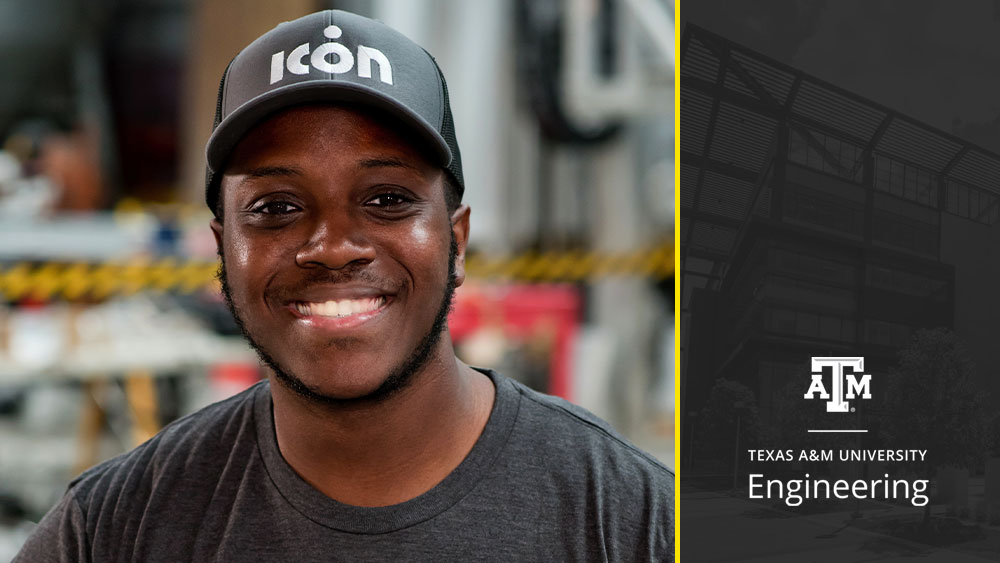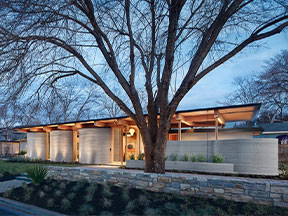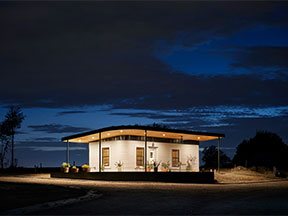
Brannon Veal ’11, a former student in the Department of Electrical and Computer Engineering at Texas A&M University, enjoyed a busy and successful college career. His time at Texas A&M helped prepare him for his dream job of serving others by working for ICON, a company that builds 3D-printed houses for underprivileged groups, middle class families and space exploration.
Veal grew up in Cedar Hill, Texas, just south of the Dallas/Fort Worth Metroplex. He had always heard about Texas A&M from his great uncle Dr. Ed Childs ’89, a former professor at the Texas A&M Health Science Center and graduate of the College of Medicine. Once Veal saw Aggieland for himself, he was struck by the sense of family that existed on campus and knew that Texas A&M was the place for him.
While attending school, Veal was involved in Century Singers, the Texas A&M Jazz Band and other on-campus Christian organizations. He also worked at the Space Engineering Institute, a work-study program led by Dr. Magda Lagoudas, executive director of industry and nonprofit partnerships in the College of Engineering, and Dr. John E. Hurtado, interim vice chancellor and dean of the College of Engineering.
He also spent time working on the Dark Energy Camera Calibration System at Texas A&M’s Astronomical Instrumentation Laboratory and spent two summers interning with NASA’s Ames Research Center as a part of the NASA Motivating Undergraduates in Science and Technology program.
Veal also met his wife, Dr. Raven (Cunningham) Veal ’10, while at Texas A&M. Learning about the challenges faced by underprivileged and minority populations around the globe, the pair felt the need to help. For Veal, it was addressing homelessness using his engineering degree.

Veal later met Evan Loomis ’03, Alex Le Roux and Jason Ballard ’05, founders of ICON, a start-up with the mission to, “re-imagine the approach to homebuilding and construction to make affordable, dignified housing available to everyone throughout the world.”
They explained to him that over 1 billion people in the world do not have adequate shelter and they intended to help solve the inefficient and unsustainable process of homebuilding by 3D-printing homes that the average person could afford. Immediately, Veal knew he was on board and joined ICON full time in 2019.
As an senior electrical control engineer, Veal works with a next-generation robotic 3D printer that is capable of producing homes and structures. The technology cuts down on the cost, time and materials needed to create homes built to the international building code. These homes are expected to last longer than standard concrete masonry-built homes, and consist of "Lavacrete," a proprietary cementitious material, which makes the structure resilient and energy efficient.

In 2018, ICON completed the first permitted 3D-printed home in the U.S. Since then, they’ve collaborated to create 3D-printed home communities benefiting underprivileged groups in Tabasco, Mexico, and Austin, Texas. In 2022, ICON will break ground on a community of 100 3D-printed homes near Austin in partnership with Lennar, the largest neighborhood of its kind in the world.
Veal is excited by what they’ve accomplished at ICON, which has even led to work with both the Department of Defense and NASA to research and develop autonomous additive construction systems for future exploration of the moon and long-duration human habitats on Mars. His proudest accomplishment is serving underprivileged communities and doing his part to help solve the housing crisis experienced by people in his own backyard and around the world.
Veal and his wife reside in Austin.
Highlighting Success
The College of Engineering is proud of the work that our former students do to ignite change and pursue excellence in the service of others. If you know an engineering former student who is changing their industry for the better, contact the Office of Alumni Relations.